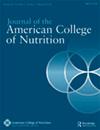玫瑰糖浆和万年菊粉对营养谷物和乳基功能饮料理化、植物化学、感官和贮藏特性的影响。
IF 3.4
4区 医学
Q2 NUTRITION & DIETETICS
Journal of the American College of Nutrition
Pub Date : 2021-02-01
Epub Date: 2020-03-24
DOI:10.1080/07315724.2020.1744487
引用次数: 7
摘要
摘要:本试验旨在研究玫瑰糖浆和万寿菊粉对营养谷物(指谷、燕麦)和乳基功能饮料(FB)理化性质、生物活性、感官接受度和贮藏寿命的影响。方法:采用不同浓度的玫瑰糖浆(8-14%)和万金菊粉(0.40-0.55%)分别在预标准化FB中进行初步试验。在感官分析的基础上选择最可接受的浓度。然后对选定的饮料进行理化分析、生物活性化合物评估和红外光谱表征。研究了花提取物对饮料中矿物质含量和保鲜期(4±1℃)的影响。采用Duncan's multiple range test (SPSS 25.0)分析处理间的显著性差异。结果:玫瑰糖浆和万寿菊粉的最佳可接受浓度分别为10%和0.50%。添加玫瑰糖浆显著降低了饲粮纤维(6.50%)和β-葡聚糖(3.95%)含量(p≤0.05)。添加花提取物后,总酚(119.18 ~ 145.23%)、β-胡萝卜素(0.37%)、花青素(78.82 ~ 230.58%)和抗氧化活性(4.98 ~ 7.17%)均显著(p≤0.05)提高。FTIR表征在3600- 3200,3000 -2800和1700-1600 cm -1区域观察到强峰。添加玫瑰糖浆也显著降低了FB的矿物质含量。玫瑰味饮料的总体可接受度(7.83±0.23)和冷藏稳定性(50 d)在配制饮料中最高。结论:花提取物的加入显著提高了所制饮料的接受度。它不仅改善了植物化学特征,而且对贮藏稳定性有实质性的影响。本文章由计算机程序翻译,如有差异,请以英文原文为准。
Effect of Rose Syrup and Marigold Powder on the Physicochemical, Phytochemical, Sensorial and Storage Properties of Nutricereals and Milk-Based Functional Beverage.
ABSTACT Aim: The present study aimed to investigate the effect of rose sirup and marigold powder on the physicochemical properties, bioactive potential, sensory acceptability and storage life of the nutricereals (finger millet, oats) and milk-based functional beverage (FB). Method: Preliminary trials were performed using different levels of rose sirup (8–14%) and marigold powder (0.40–0.55%) in the pre-standardized FB. The most acceptable concentration was selected on the basis of sensory analysis. Selected beverages were then subjected to the physicochemical analysis, assessment of bioactive compounds and FTIR characterization. The effect of flower extracts on the mineral content and storage life (4 ± 1 °C) of beverages was also studied. The significant difference in treatments was determined using Duncan’s multiple range test, SPSS 25.0. Results: The best acceptable concentrations for rose sirup and marigold powder were 10% and 0.50%, respectively. A significant (p ≤ 0.05) decrease in the dietary fiber (6.50%) and β-glucan (3.95%) content was observed on the addition of rose sirup. Significant (p ≤ 0.05) increase in the total phenols (119.18–145.23%), β-carotene (0.37%), anthocyanins (78.82-230.58%) and antioxidant activity (4.98–7.17%) was observed on the addition of flower extracts. Strong peaks were observed in the regions of 3600–3200, 3000–2800 and 1700–1600 cm − 1 on FTIR characterization. A significant decrease in the mineral content of FB was also found on the addition of rose sirup. Rose flavored beverage had the highest overall acceptability (7.83 ± 0.23) and storage stability (50 days at refrigerated storage) among the prepared beverages. Conclusion: The addition of flower extracts significantly improved the acceptability of the prepared beverages. It not only improved the phytochemical profile but also had a substantial impact on storage stability.
求助全文
通过发布文献求助,成功后即可免费获取论文全文。
去求助
来源期刊
自引率
0.00%
发文量
0
审稿时长
>12 weeks
期刊介绍:
The Journal of the American College of Nutrition accepts the following types of submissions: Original and innovative research in nutrition science with useful application for researchers, physicians, nutritionists, and other healthcare professionals with emphasis on discoveries which help to individualize or "personalize" nutrition science; Critical reviews on pertinent nutrition topics that highlight key teaching points and relevance to nutrition; Letters to the editors and commentaries on important issues in the field of nutrition; Abstract clusters on nutritional topics with editorial comments; Book reviews; Abstracts from the annual meeting of the American College of Nutrition in the October issue.

 求助内容:
求助内容: 应助结果提醒方式:
应助结果提醒方式:


